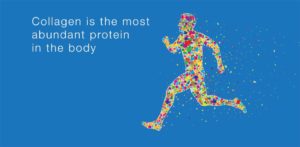The building blocks that make up all proteins, including collagen, are called amino acids. An essential amino acid is one your body cannot make, so you have to get it from food or dietary supplements. Collagen is the most abundant protein in the body and is a key constituent of all connective tissues. Collagen provides the infrastructure of the musculoskeletal system, essential for mobility. The intake of collagen ensures the cohesion, elasticity and regeneration of skin, hair, tendon, cartilage, bones and joints. Collagen is a protein made up of amino-acids: glycine, proline, hydroxyproline, and arginine. The composition of collagen is considered unique given its high hydroxyproline content. If you lack the amino acids that combine to form collagen, your body’s cells can’t produce enough of it. Threonine is an essential amino acid for collagen production.
Collagen is an important building block for the skin. It makes up to 30% of the protein of the living body and 70% of the protein that makes up skin. Collagen ensues the cohesion, elasticity and regeneration of skin. Skin tissue is composed of various molecules, some of which are amino acids, and these amino acids are essential for maintaining an even skin structure and thus healthy skin. The dermis, which provides the foundation for the skin, is closely involved in the skin’s elasticity and flexibility. Collagen is the main component of the dermis. Maintaining the amount of collagen is the key to beautiful skin. Glycine, proline, alanine and hydroxyproline are the main constituents of collagen; replenishing these constituent amino acids appears to be needed to maintain the amount of collagen at healthy levels.
Ligaments are another type of connective tissue that attach two bones and consequently hold the joints together. Tendons that attach two bones and consequently hold the joints together. Tendons are similar but different type of tissue that attach the muscles to the bones. All of these tissues, the bones, ligaments, tendons, and the skeletal muscles themselves are made up of proteins. The most predominant protein is collagen.
Collagen is vital for strengthening blood vessels and giving skin its elasticity and strength. The degradation of collagen causes wrinkles and other skin issues. As such collagen is one of the most popular supplements because of its skin healing properties. Collagen has very good tensile strength. it is one of the long fibrous structural proteins that gives cells structure from the outside, as well as supporting the majority of the body’s tissues. Collagen is necessary for conserving the youthfulness of skin and attenuating wrinkles, it is also essential for the elasticity of the connective tissue of the skin, allowing it to expand and contract without damaging any tissues.
When we get older, the production of collagen begins to slow down and cell structures start losing their strength. As a result, skin starts to become fragile, less elastic and wrinkles start to set in. In addition, hair starts losing its color, joints lose their flexibility, and bone quality begins deteriorating. Individuals seek out ways to stimulate the production of collagen when wrinkles start to show. Even though your body may not produce the same levels of collagen as it once did, stimulating your collagen production has the potential to reverse some signs of aging. Since our Collagen Protein gelatin is denatured collagen, it might just improve your body’s own collagen levels.
Threonine is one of the essential amino acids in collagen peptides. Threonine supports cardiovascular, liver, central nervous, and immune system function. Threonine aids in the synthesis of glycine and serine, two amino acids that help the production of collagen, elastin, and muscle tissue. Threonine helps build strong bones and tooth enamel. It also speeds up wound healing after injury by boosting immune system. Threonine combines with the amino acids aspartic acid and methionine to help liver digest fats and fatty acids, which reduces accumulation of fat in the liver. [1]
Vital Proteins Collagen contains 18 amino-acids, including 8 out of 9 essential amino-acids. It is characterized by the predominance of glycine, proline and hydroxyproline, which represent about 50% of the total amino-acid content. Glycine and proline concentration is 10 to 20 times higher than in other proteins. This very specific composition of amino acids, provides Vital Proteins Collagen with nutritional functional properties that can not be found with other protein sources. Our Collagen is a high purity natural bio-active product containing more than 97% protein, supplied in a form that can be easily used and digested by the human body. Above from Vital Proteins Website
[1] Das, Biplab. Amino Acid Threonine: Health Benefits, Deficiency and Food Sources. Dietary Fiber Food. (April 5, 2012) http://www.dietaryfiberfood.com/amino-acids/threonine-food-sources.php

